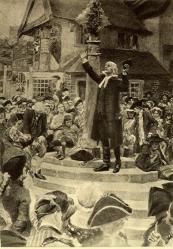 In the following excerpts, Al Martin describes how we may begin to distinguish great preaching from poor:
In the following excerpts, Al Martin describes how we may begin to distinguish great preaching from poor:
A thing is judged to be good or bad in terms of its proximity to an absolute standard. Of course, in the realm of what is effective or good preaching, there is no single, comprehensive standard. However, I believe we can glean from the Scriptures an accurate standard as to what good preaching is by examining the preaching of the prophets, of the apostles, and of our Lord Jesus Christ. Another basis of comparison is to be found in the lives, ministries, and sermons of the great preachers of past ages. When I use the term ‘great preachers’, I am not thinking of men who are renowned primarily for their ability to embellish the truth of God with great rhetorical effects, or who are known for their proficiency in the art of elocution. Rather, I am thinking of men who were instruments of God in moving other men Godward. Into this particular category I would place such men as Whitefield, M’Cheyne Spurgeon, Edwards, Baxter and Bunyan. . . .
Let us consider together this matter of what is wrong with preaching in terms of the man who preaches. I wish to state a principle, illustrated from the Scriptures, and then to apply it in several specific areas. The principle is this: that unless we would degrade preaching to a mere elocutionary art, we must never forget that the soil out of which powerful preaching grows is the preacher’s own life. This is what makes the art of preaching different from all other arts of communication. A well-known actress may be famous for her ‘moral’ escapades. She may live like a common harlot. Yet she can enter the theatre at eight o’clock on a Wednesday night and play the role of Joan of Arc in such a way as to move the entire audience to tears. The way in which she lives may have no direct relationship with the exercising of her professional art. . . .
It is readily admitted that the Scriptures teach that there are times when men appear on the scene who have great ministerial gifts, but who are devoid of sanctifying grace [See Matthew 7:21-23]. The history of the church also records the deeds of men who were used sovereignly by God in the exercise of ministerial gifts who proved ultimately to be devoid of sanctifying grace. I believe, however, that this particular problem of deception would primarily apply to those engaged in the kind of ministry where they are not domiciled among their hearers long enough for their lives either to add or detract from the impact of their ministry. Therefore, limiting this principle to the context of pastoral preaching, I believe it is a valid rule [with some few exceptions] that powerful preaching is rooted in the soil of the preacher’s life. It has been said, ‘A minister’s life is the life of his ministry.’ If preaching is the communication of truth through a human instrument, then the particular truth thus communicated is either augmented or reduced in its effect by the life through which it comes.
The secret of the preaching power of Whitefield, M’Cheyne and the other men I have already mentioned, is found not primarily in the content of their sermons or in the manner of their delivery. Rather, it is found in their lives. Their lives were so clothed with power, and they lived in such vital communion with God that the truth became a living principle when it came through such vessels. Their anointed lives became the soil of their anointed ministries. This principle is particularly true in the life of a resident pastor. The more you and I are known by our people; our influence will increase or diminish according to the tenor of our lives. (“What’s Wrong with Preaching”)
Filed under: Bible, Christianity, Church Leadership, God, Holiness, Humility, Samuel at Gilgal | Tagged: Charles Spurgeon, George Whitefield |


























































Reblogged this on Preacher12's Blog.
LikeLike
Great reminder! Thanks a lot!
Reblogged it on:
LikeLike